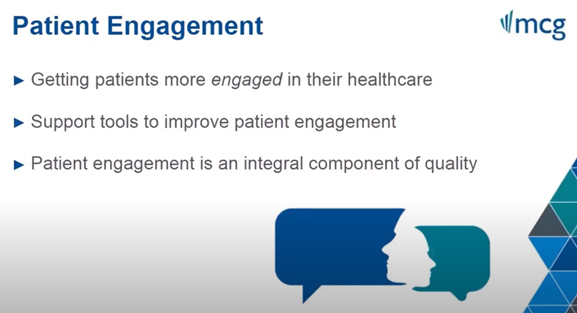Optimizing Post-Acute Care Management: Four Key Takeaways from MCG Health Experts
By Claire Thayer, August 4, 2021
Recently, MCG Health’s Suzanne Doran, Managing Editor and Emily Ferguson, Associate Managing Editor, joined us in a webinar discussion on ways to engage patients, identify social determinants of health, and ultimately improve health outcomes while managing costs. We caught up with Suzanne and Emily on four key takeaways:
1. Do you have more than one assessment to address Social Determinants of Health?
Suzanne Doran and Emily Ferguson: MCG Health currently has 9 assessments that address Social Determinants of Health. These assessments screen for needs such as food insecurity, homelessness, and social support. Based on individual needs, a plan of care is then generated to assist the patient and care manager address any barriers to care.
2. How are Accountable Care Organizations utilizing evidence-based care guidelines to help improve quality of care for their patients?
Suzanne Doran and Emily Ferguson: Accountable Care Organizations are using evidence-based care guidelines for coordinating care for patients across care settings, including chronic disease management and transitions of care. Evidence-based interventions allow providers to focus on giving their patient the care they need, at the right time. Patient care and quality are improved as a result of evidence guiding practices to improve adherence to preventative services and reduce complications associated with chronic disease. Here are links to some real-world case studies of ACOs using evidence-based guidelines and achieving success: Delaware Valley ACO and UnityPoint Accountable Care.
3. Can you share more information on how you approach building a plan of care for patients?
Suzanne Doran and Emily Ferguson: Care planning is individualized to the patient’s specific care needs and goals in order to incorporate the patient’s personal preferences and account for the patient’s unique medical and psychosocial situation. From the individualized self-care plan, case managers can provide the patient with specific and appropriate education, support, and timely follow-up in a manner that adapts to the patient’s capabilities and needs, versus a general plan that may overwhelm the patient because it’s too much information provided too soon:

4. Tell us more about the teach-back method and best practices for initiating patient understanding using this technique.
Suzanne Doran and Emily Ferguson: The teach-back method clarifies the learner’s understanding of instructions by having the patient give a return demonstration or vocally repeat (in his or her own words) what the patient just learned to assure comprehension of material. An example of teach-back could be having a patient demonstrate how to administer self-injections by using an insulin syringe to inject an orange. This method has been shown to be effective in discharge planning as well as the patient’s vocalization of what medications they should take, when their next appointment is, or warning signs of a problem to their case manager.
If you missed this informative webinar presentation, Populations at Risk: Optimizing Post-Acute Care Management, we invite you to watch the full On-Demand webinar video or short webinar re-cap video.

 Share This Post
Share This Post 
Reader Comments